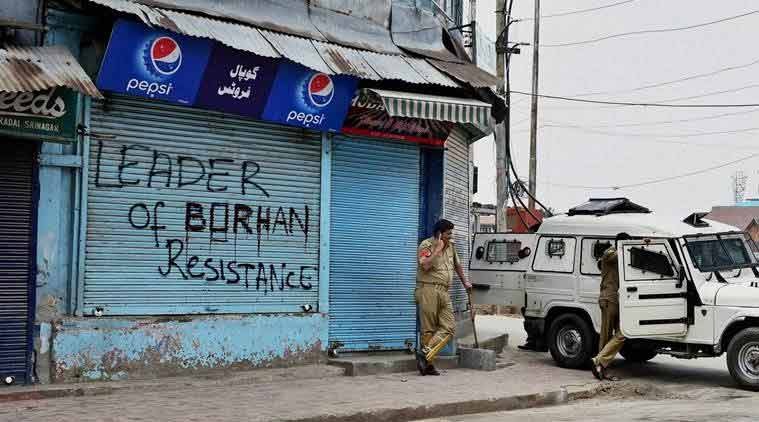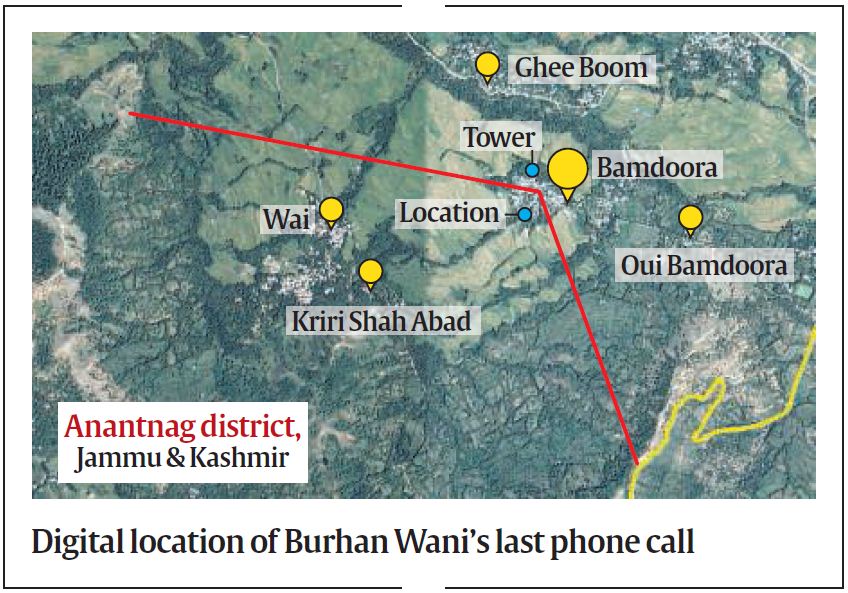- India
- International
Decoding Burhan Wani’s death: Behind hot pursuit, hunt for informer who turned cold
The man they were looking for was a Kokernag cloth salesman called Sartaj Ahmad Sheikh — before becoming the man the SOG most wanted dead, he used to be one of their treasured assets.
 Srinagar: Policemen guard a street during restriction and strike on fourth consecutive day in Srinagar. (PTI photo)
Srinagar: Policemen guard a street during restriction and strike on fourth consecutive day in Srinagar. (PTI photo)
Fury washed over the small village of Bamdoora as police jeeps took away Hizbul Mujahideen terrorist Burhan Wani’s body in the fading evening light. It swept over businessman Khurram Shafi Mir’s orchard, uprooting the Bulgarian apple saplings he hoped would revolutionise Kashmir’s fruit industry, and torched his workers’ huts and tools. Then, it razed the home of Farooq Wani, where Burhan Wani had come to spend Eid, and six others alongside it.
The villagers of Bamdoora, meanwhile, are struggling to make sense of what happened. Farooq Wani poisoned Burhan Wani, shouts one young man, standing with a stone in his hand at an impromptu barricade on the road to the village. The walls in the house were red with blood, claims another.
But an investigation by The Indian Express, based on interviews with intelligence and police officials involved in the operation and classified documents, has found that behind Burhan Wani’s killing lies a story of deception and betrayal in which his death was just collateral damage — the original target was the man accompanying him.
Who was Sartaj Sheikh?
Late on the morning of July 8, the day Burhan Wani was to die, personnel at the Srinagar unit of J&K’s Special Operations Group (SOG) listened in as Farooq Wani made an innocuous call: he had unexpected guests for Eid. The SOG’s Srinagar unit reached Anantnag just after lunchtime to brief their counterparts in the SOG and the Army’s 19 Rashtriya Rifles on plans to reach Bamdoora without attracting attention.

The man they were looking for was a Kokernag cloth salesman called Sartaj Ahmad Sheikh — before becoming the man the SOG most wanted dead, he used to be one of their treasured assets.
Watch Video: What’s making news

”Sartaj Ahmad Sheikh had become the critical link between the Hizb-ul-Mujahideen’s leadership in Pakistan and their units in south Kashmir. He was the man charged with putting guns in the hands of Burhan Wani’s boys,” said a senior police officer.
Like over a hundred other young Kashmiris, Sheikh had crossed the Line of Control (LoC) to join the Hizb-ul-Mujahideen in 2000. India had won the Kargil war, and Gen Pervez Musharraf’s regime responded by stepping up the jihad in Kashmir to record levels. Attacks on Indian forces surged from 1,390 in 1999 to 1,994 in 2001, while their fatalities shot up from 387 to 577. The numbers of civilians killed climbed sharply, too, from 799 to 971.
Then came the India-Pakistan military crisis of 2001-2002 — and Gen Musharraf’s regime backed down, cracking down on infiltration across the LoC. Sartaj Sheikh was to spend the next nine years in a Hizb camp in Muzaffarabad, living on a dole as the jihad disintegrated.
Born in 1988 to Munawar Sheikh and Nageen Banu, the second of their four daughters and two sons, Sartaj Sheikh was part of the many unemployed, semi-educated men who emerged from Kashmir’s poorer neighbourhoods through its years of violence. The girls did well — Ruqiya Sheikh has completed a BEd, while Saishta Sheikh is finishing her undergraduate education — while both boys struggled in school.
”The boys used to get scolded a lot at home and ended up spending most of their time on the streets. There were no role models for them, except the mujahideen,” said a friend of the family.
In 2009, though, the increasingly frustrated Sartaj Sheikh asked his family to arrange for him to travel back from Pakistan, joining hundreds of other jihadists leaving their camps. The journey home through Kathmandu, family sources said, cost Munawar Sheikh over Rs 2.5 lakh. Sheikh, as part of a deal arranged through the SOG’s Anantnag unit, spent a year in prison, and was then released without having to face charges.
Sartaj Sheikh began working as a salesman at the Malik Cloth House at Anantnag’s Cheeni Chowk but, as the only member of his family in full-time employment, found it hard to make ends meet.
In 2012, as a number of young people again began to join the Hizb-ul-Mujahideen in response to Burhan Wani’s online propaganda, the SOG had an offer for the jihadist-turned-salesman. He was to begin working for the Hizb again — this time, as an undercover agent for the police’s counter-terrorism effort.He was welcomed into the terror group’s ranks: no one else had any real knowledge of fighting, and, with no contacts in its central leadership, Burhan Wani himself was initially seen as a potential traitor by the Hizb leadership in Pakistan.
The hunt for Sheikh
From Sartaj Sheikh’s police dossier, it’s clear his infiltration of the Hizb caused it significant damage. The police were able to closely monitor Muhammad Iqbal Bhat, despatched by the Hizb command through Kathmandu in 2012 to arm and train their new south Kashmir networks. They disrupted the work of Bhat’s successor, Sajjad Ahmad Dar, sent two years later. Fearing betrayal, Burhan Wani himself remained holed up in his Tral heartland, unable to organise units elsewhere.
Because of spies like Sartaj Sheikh, Burhan Wani’s social media charm wasn’t reviving the Kashmir insurgency: the recruitment of young Kashmiris showed an uptick from 2014 — but violent incidents declined, as did attacks on and fatalities of security forces.
In December 2014, though, Sartaj Sheikh disappeared from his home, and broke all contact with the SOG. No one knows exactly why. “He’d been promised a new beginning somewhere else, and instead found himself in constant danger, with no way out. That’s how it is in this game. Perhaps, he cracked. Perhaps, he just got sick of betraying people and watching them die,” said an officer associated with the case.
Finding Sartaj Sheikh became the top priority for the SOG in south Kashmir because he had the ability to compromise their counter-terrorism operations significantly. The SOG mounted multiple raids targeting Sartaj Sheikh in the first half of 2015 — at least two directed at the home of his maternal uncles in Bamdoora, Farooq Ahmad Wani and Nasir Ahmad Wani. They came up blank.
Trap begins to close
In May, however, the trap finally began to close — aided by an unexpected gift delivered to the SOG. Even as Sartaj Sheikh had drifted into the Hizb’s embrace, a key figure in Burhan Wani’s circle was headed out. That month, Tariq Ahmad Pandit, walked out of the orchards near Karimabad in Pulwama, armed with a pistol, six rounds and two grenades. Police records show Tariq Pandit was arrested but sources said that he, in fact, had surrendered. “He’d given up the fight,” said an official.
The 1996-born son of a local butcher in Pulwama’s Neva, Tariq Pandit had finished high school and won a place with Himayat, a Central government skills training scheme that sent him to work at a coffee shop in Hyderabad. He returned after the 2014 floods, though, only to discover there weren’t many prospects for coffee shops in rural Kashmir — and ended up driving a truck.
In March, 2015, Tariq Pandit joined the Hizb, helping police constable Nasir Pandit steal rifles from the home of a PDP minister where he was posted — almost on a whim, family members said.
The following months, though, saw his new friends hunted down and killed. Adil Khandey and Farooq Sheikh, among the men Tariq Pandit first met, died within weeks. Naseer Pandit and Waseem Malla were shot dead in September 2015, followed in quick time by Aafaqullah Bhat and Bilal Bhat this April.
In each case, the Hizb’s internal enquiries suggested the men had been betrayed — often by informers working for the SOG. The Hizb’s clumsy counter-intelligence efforts, however, rarely succeeded in staunching the flow of information to police.
At Naseer Pandit’s funeral, a member of Tariq Pandit’s immediate family told The Indian Express, he became enraged as mourners came in. “Tariq was screaming, saying, ‘You people come here to mourn, and shout slogans for azadi (freedom), and then you go away and sell us’,” said the family member.
For police, Tariq Pandit’s arrest was a windfall. His detailed knowledge of Burhan Wani’s network of safehouses finally forced the Hizb commander to leave Tral. In one case, it transpired, Burhan Wani had been sitting in a hideout built inside a high-school attic, while J&K Education Minister Naeem Akhtar lectured students below.
Then, on June 8, 2016, police and the 42 Rashtriya Rifles cordoned off a school in Lurgam were Burhan Wani was hiding. The Hizb commander managed to shoot his way out, using civilians leaving the building as cover — but would never return to Tral.
PDP leader Muzaffar Beigh has said Chief Minister Mehbooba Mufti was not informed of the July 8 raid on Bamdoora, in an effort to distance her from its outcomes. However, highly placed police sources said she was informed, in writing, of the June 8 raid as well as an operation targetting Burhan Wani in March.
Four weeks after he escaped Tral, cellphone records now being analysed by the J&K Police show that Burhan Wani made his last call, using one of over 500 SIM cards he circulated over the last six months through the phone recovered from his body.
The call, records show, was made just a few hours before Sartaj Sheikh came out of his uncle’s home firing, perhaps hoping to cover the escape of the man he’d once helped hunt. Burhan Wani and his relatively unknown associate, Pervaiz Ahmad, tried leaving through the back, police say, and were gunned down.
Late the next night, a small group of armed men visited Shabir Ahmad Pandit and Manzoor Ahmad Pandit, cousins of Tariq Pandit, at their home in Karimabad. They were shot through the legs, a single bullet each, fired at point-blank range — the Hizb’s traditional punishment for police informers in cases where their actions caused significant harm to the group.
The shootings passed almost unnoticed: by then, a wave of carnage no one had expected or foreseen had been unleashed across Kashmir.
Apr 23: Latest News
- 01
- 02
- 03
- 04
- 05






































